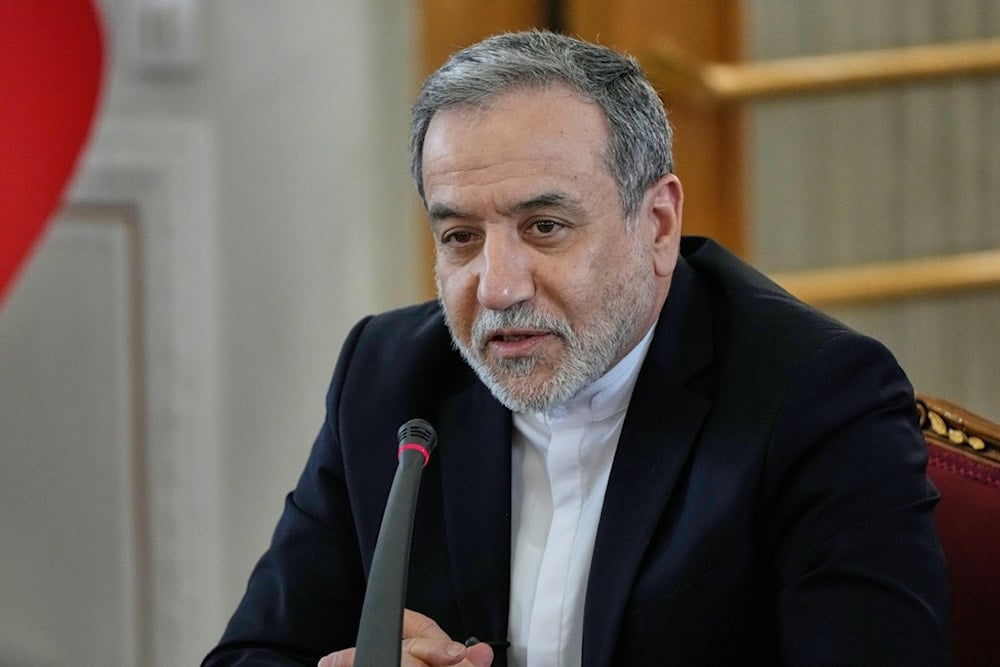Iran-China-Russia alliance to counter EU snapback move: Tehran
Iran, China, and Russia have intensified their coordination to counter the European Union's snapback sanctions.
-

Iranian Foreign Minister Abbas Araghchi speaks in a meeting with ambassadors and representatives of foreign countries in Tehran, Iran, Sunday, Oct. 5, 2025 (AP Photo/Vahid Salemi)
Iranian Foreign Minister Abbas Araghchi announced on Sunday that Tehran, Beijing, and Moscow are intensifying their coordination to resist unilateral European measures linked to the reactivation of the so-called "snapback" mechanism under the 2015 nuclear deal.
Speaking during a cabinet session in Tehran, Araghchi outlined the latest diplomatic steps taken by Iran to confront Western pressure, stressing that "trilateral cooperation between Iran, China, and Russia seeks to neutralize the European Union's unilateral actions tied to the snapback mechanism."
He said the three nations are acting in concert to prevent the re-imposition of illegal sanctions and to preserve the spirit of multilateralism at a time when the West, led by Washington and its European partners, seeks to reassert dominance through coercive diplomacy.
China Blames Washington for Current Crisis
Beijing has repeatedly warned that the United States' withdrawal from the Joint Comprehensive Plan of Action (JCPOA) in 2018 remains the root cause of the current crisis. During a September 30 press briefing, Chinese Foreign Ministry spokesperson Guo Jiakun stressed that the activation of the snapback mechanism was "not constructive and has severely reversed the political and diplomatic process of resolving the Iranian nuclear issue."
Guo added that "peacefully resolving the Iranian nuclear issue through political and diplomatic means is the only viable option," urging Washington and its European allies to abandon pressure tactics and return to dialogue. China, he affirmed, will continue to play "a constructive role" in maintaining balance and preventing further escalation.
Non-Aligned Movement Backs Tehran
Araghchi's comments follow a major diplomatic breakthrough at the 19th Ministerial Meeting of the Non-Aligned Movement (NAM) held in Kampala, Uganda, in mid-October, where more than 100 member states endorsed Iran's stance against the European-led sanctions drive.
The NAM's final communiqué reaffirmed that UN Security Council Resolution 2231 remains valid and that its provisions, particularly the October 18, 2025, deadline for lifting all nuclear-related restrictions, must be respected. Araghchi described the declaration as "a major achievement for the Islamic Republic of Iran," emphasizing that it demonstrates overwhelming international rejection of Western unilateralism.
The summit also condemned the Israeli-US military attacks on Iran and Hezbollah earlier in the year, calling them "heinous" and "unacceptable," further signaling the NAM's growing alignment with anti-imperialist movements across West Asia.
Europe's "Illegality" and Iran's Strategic Response
The E3, France, Britain, and Germany, formally triggered the snapback mechanism on August 28, 2025, arguing that Iran had failed to meet its nuclear obligations. Under Resolution 2231, the clause allows any participant to re-impose UN sanctions if it claims "significant non-performance" by Tehran.
Iran, supported by Russia and China, has denounced the move as "illegal and politically motivated," pointing out that the E3 forfeited their legal standing after aligning with Washington's withdrawal from the deal. In a joint letter to the UN, the three nations warned that Europe's actions risk deepening regional instability and undermining the credibility of the Security Council.
On October 18, Tehran declared that the JCPOA had "effectively expired," asserting that all related restrictions had been terminated and that the West's attempts to revive them lack any legal foundation.
A Shifting Global Order
Araghchi underscored that the evolving cooperation among Iran, Russia, and China, coupled with mounting support from the Global South, marks a decisive shift in world politics.
"We are witnessing the formation of a new kind of global polarization," he said. "On one side stand the European states and a minority allied with them, and on the other side stand the majority of nations, led by Iran, Russia, and China, that uphold the principles of independence, multilateralism, and international justice."
Tehran has also expanded coordination with its allies in the energy, finance, and defense sectors to cushion the impact of sanctions. Analysts view the initiative as part of a wider effort to advance a multipolar world order based on sovereignty, non-interference, and equitable global governance, contrasting sharply with the West's strategy of pressure and conditionality.
Read more: Araghchi: Iran committed to diplomacy despite Western escalation

 4 Min Read
4 Min Read








